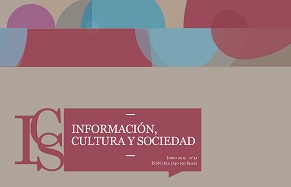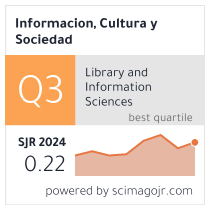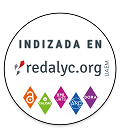Digital literacy in the indigenous communities Ranquel and Huarpe within the program digital public schools of San Luis, Argentina. A case study
Abstract
This study analyzes digital literacy in the indigene communities Huarpe and Ranquel, located in the north-west and south-east of San Luis, Argentina, respectively. Both communities belong to the program "Digital Public Schools" from the University of La Punta, in which teachers work with different technologies as tools for enabling content and increasing digital skills useful for functioning in the knowledge society. This study aims to share an experience that arises as a result of State policies implemented in the province of San Luis (Argentina) to contribute to the educational inclusion of the Huarpe and Ranquel communities. The methodology used is case study, and in accordance to that, we have organized open semi-structured interviews and participant observation to collect data within a qualitative approach. For this aim, we have considered identity issues that are at the heart of communities and help to understand the contradictions that mark the way towards cultural integration. There is still a long way to go, through recovering the past, living in the present and looking towards the future, after a process of silencing of more than five hundred years. This task calls for creativity in the process of hybridizations and cultural mix.Downloads
References
Aparici, Roberto, coord. 2010. Educomunicación más allá del 2.0. Barcelona: Gedisa
Baldivieso, Silvia y Selín Carrasco. 2014. Escuela pública digital en pueblos originarios. La propuesta de la Universidad de la Punta para las comunidades Ranquel y Huarpe de la provincia de San Luis, Argentina. En RED - Revista de Educación a Distancia. No 41. <http://www.um.es/ead/red/41/carrasco.pdf> [Consulta: 10 junio 2016].
Bourdieu, Pierre y Jean Claude Passeron. 1979. La reproducción. Barcelona: Laia.
Carrió Pastor, María Luisa. 2007. Ventajas del uso de la tecnología en el aprendizaje colaborativo. En Revista Iberoamericana de Educación. No. 41/4. <http://rieoei.org/1640.htm> [Consulta: 10 junio 2016].
Civallero, Edgardo. 2008. Culturas ancestrales en universos modernos En Digithum. No. 10. <http://www.uoc.edu/digithum/10/dt/esp/civallero.pdf> [Consulta: 10 junio 2016].
Corbetta, Piergiorgio. 2003. Metodología y Técnicas de Investigación Social. Madrid: McGraw-Hill.
Cuesta Moreno, Oscar Julián. 2012. Investigaciones radiofónicas: de la radio a la radio indígena. Una revisión en Colombia y Latinoamérica. En Ánfora. Vol. 19, no. 33, 165-183. <http://www.redalyc.org/html/3578/357834267008/> [Consulta: 10 junio 2016].
Díaz De Salas, Sergio A.; Víctor M. Mendoza Martínez y Cecilia M. Porras Morales. 2011. Una guía para la elaboración de estudios de caso. En Razón y Palabra. Vol. 16, no. 75. <http://www.redalyc.org/articulo.oa?id=199518706040> [Consulta: 10 junio 2016].
Escolar, Diego. 2007. Los dones étnicos de la nación. Buenos Aires: Prometeo.
Ferrés, Joan. 2014. Las pantallas y el celebro emocional. Barcelona: Gedisa.
Finquelievich, Susana y Alejandro Prince. 2010. El desarrollo de una provincia digital. La Punta, San Luis: Universidad de La Punta. <http://www.razonypalabra.org.mx/N/N74/libros74/03FinquelievichL74.pdf> [Consulta: 10 junio 2016].
Fuenmayor, Miguel Antonio y Oscar José Antepaz. 2009. La comunicación radial intercultural bilingüe en el Zulia. En II Congreso Invecom. Asociación de Investigadores Venezolanos de la Comunicación. Venezuela <http://congresoinvecom.org/index.php/invecom2009/invecom2009/paper/view/46/51> [Consulta: 10 junio 2016].
García Matilla, Agustín. 2002. Educomunicación en el siglo XXI. <http://www2.uned.es/ntedu/asignatu/7_Agutin_G_MatillaI1.html> [Consulta: 14 junio 2016].
Gutiérrez Martín, Alfonso. 1997. Educación multimedia y nuevas tecnologías. Madrid: Ediciones de la Torre.
Kantor, Débora. 2008. Variaciones para educar adolescentes y jóvenes. Buenos Aires: Del estante.
Kress, Gunther. 2005. El alfabetismo en la era de los nuevos medios de comunicación. Granada: El Aljibe.
Laime Pérez, Franz Gabriel. 2009. Radiodifusión boliviana Aymara en el fortalecimiento del pueblo Aymara más allá de las fronteras. Cochabamba: Universidad Mayor de San Simón. Tesis de Maestría.
López López, Pedro y Toni Samek. 2009. Inclusión digital: un nuevo derecho humano. En Educación y Biblioteca. No. 172, 114-118.
Núñez Delgado, María del Pilar y José Antonio Liébana Checa. 2004. Reflexión ética sobre la (des)igualdad en el acceso a la información. En Comunicar. Vol. 22, 39-45.
Pimienta, Daniel. 2007. Digital Divide, Social Divide, Paradigmatic Divide. <http://funredes.org/mistica/english/cyberlibrary/thematic/Paradigmatic_Divide.pdf> [Consulta: 9 junio 2016].
Ramos, J. y A. Díez. 2004. Viejas y nuevas tecnologías. El servicio de avisos de las radios indigenistas de México. En Bruce, G., ed. Secreto a voces. Radio, NTICs e interactividad. Roma: Organización de las Naciones Unidas para la Agricultura y la Alimentación.
Saldi, Leticia. 2015. Huarpes no tan huarpes y hombres modernos: interpelaciones étnicas y disputas por las últimas tierras irrigadas en Mendoza (Argentina). En AIBR Revista de Antropología Iberoamericana Vol.10, no.2, 203-229. <http://www.aibr.org/OJ/index.php/aibr/article/view/290/320> [Consulta: 14 junio 2016].
Sahagún, Felipe. 2004. De Gutenberg a Internet. La Sociedad Internacional de la Información. Madrid: Fragua.
Scolari, Carlos A. 2015. Tecnologías del hambre y hambre de tecnologías. De Caparrós a Martel (y regreso). <https://hipermediaciones.com/2015/08/26/tecnologias-del-hambre-y-hambre-de-tecnologias-de-caparros-a-martel-y-regreso/> [Consulta: 9 junio 2016].
Stavenhagen, Rodolfo. 2007. Los pueblos indígenas y sus derechos. México: UNESCO. <http://www.cinu.org.mx/prensa/especiales/2008/Indigenas/libro%
pdf/Libro%20Stavenhagen%20UNESCO.pdf > [Consulta: 9 junio 2016].
Tamagno, Liliana. 2011. Pueblos indígenas. Racismo, genocidio y represión. EnCorpus. Archivos virtuales de la alteridad americana. Vol 1, no 2. <http://corpusarchivos.revues.org/1164> [Consulta: 14 junio 2016].
Terrén, Eduardo. 2005. ¿Por qué se desprecia tanto la asimilación cultural? Algunas enseñanzas de la investigación sobre la integración de las segundas generaciones. En Actas de Conferencia Sociología de la Educación. Sesión 6. (septiembre 2005: Santander). <http://campus.usal.es/~aeduardoterren/Documentos/Por_que_%20se%20desprecia%20_tanto_%20la%20_asimilacion%20_cultural_Eduardo_Terren.pdf> [Consulta: 14 junio 2016].
Yin, Robert K. 1984/1989. Case Study Research: Design and Methods. Applied Social Research Methods Series. Newbury Park, CA: Sage.
Authors publishing in this journal acknowledge the conditions below:
- Authors retain the copyright of their work while they transfer the right of the first publishing to the journal, under the Creative Commons Attribution-ShareAlike 4.0 International (CC BY-SA 4.0) Licence, which allows third parties to reproduce them under the condition that express mention is given to the author and to its original publication in the journal.
- Authors may enter into other contractual and independent arrangements for the non-exclusive distribution of the version of the article published in this journal (for instance, it can be published in an institutional repository or in a book). In any case, an express mention should be given to its first publication in the journal.
- It is permitted and encouraged to publish online the articles (for example, on institutional or personal pages).


























